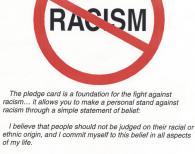Left: Bloomington's pledge card implores signers to stand against racism by pledging not to judge people by their racial origin.Right: Fort Collins, CO, employs its pledge to address hate by courageously preserving each person's dignity, as well as basic civil rights.
Left: As part of Susan Guess' anti-bullying campaign in Paducah, KY, youth at the Washington Street Baptist Church wrote pledges to stop bullying.
Right: Copies of the Marshalltown pledgesagainst hate were stuffed into various store shopping bags. Names of those who signed the pledge appeared in a free ad in the local paper, the Times-Republican, to show the community-wide support for the anti-hate movement.
pledges

Cities and towns across the United States have passed proclamations to stand together for unity and acceptance.
Enlist your Mayor to draft a Not In Our Town proclamation. Line up other leaders such as the Chief of Police, Attorney General, religious and business leaders, and prominent members of the community. Once it's passed, invite members of the general public, including students, to sign on.
Here are proclamations from Rockford, IL, San Diego, CA, Patchogue, NY, Lincoln County, OR, and San Antonio, TX as well as a general sample proclamation you can use as inspiration for writing your own.

The message of NIOT is Reaching the Classrooms and Schools of Bloomington-Normal, IL By Marc Miller, NIOT Bloomington-Normal Member
It’s parent night at at the neighborhood elementary school. Children, their parents in tow, rush from room to room, excited to show off their drawings and projects. Parents, anxious to know more about their children’s progress, take in the posters and decorations as they move from class to class. But for some, a simple table in the corridor attracts their attention. The banner draped over it says: Take a Stand Against Racism! Sign The Pledge.
“What’s this?” says a student, and a table volunteer cheerfully describes the Not In Our Town program. There are No Racism stickers for notebooks and lockers; larger stickers for bumpers and windows; even temporary tatoos. For parents, there are refrigerator cards with talking points defining common terms: predjudice, stereotype, discrimination; and a simpler set of talking points aimed at the primary grades.
